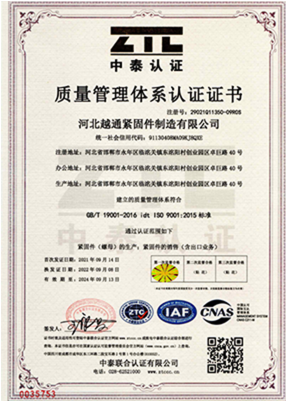aug . 12, 2024 14:36 Back to list
Exploring Various Types and Sizes of Bolts for Optimal Performance in Different Applications
Understanding Bolt Types and Sizes A Comprehensive Guide
Bolts are essential fasteners used in various applications, ranging from construction to automotive industries. Their primary function is to secure two or more components together, ensuring stability and integrity in assemblies. Given the wide variety of bolts available, understanding their types and sizes is crucial for selecting the right one for any project.
Types of Bolts
1. Hex Head Bolts One of the most common types, hex head bolts, feature a hexagonal head that can be easily tightened with a wrench. They are usually used in construction and machinery due to their strength and durability.
2. Carriage Bolts Recognizable by their rounded head and square neck, carriage bolts are designed for use in wood and metal applications. The square neck prevents the bolt from turning when the nut is tightened, making them ideal for securing wooden structures.
3. Lag Bolts Also known as lag screws, these bolts have a large diameter and coarse threads, designed for heavy-duty applications. They are commonly used in woodworking to fasten beams and other heavy materials.
4. Machine Bolts Often used in machinery and equipment, machine bolts have a flat or rounded head and are typically used with a nut to secure parts. They come in various sizes and materials, making them versatile for different applications.
5. Shoulder Bolts These bolts are characterized by a cylindrical shoulder that allows for rotation, making them useful in applications where parts need to pivot. They are commonly used in automotive and machinery assemblies.
Bolt Sizes
bolt types and sizes

When it comes to bolt sizes, several factors must be considered, including diameter, length, and thread pitch. The diameter is the width of the bolt shaft, measured in either metric (millimeters) or imperial (inches) units. Common diameters range from 1/4 inch to 1 inch for imperial measurements and M6 to M20 for metric measurements.
Length refers to the distance from the underside of the head to the end of the bolt. It is critical to select the proper length to ensure that the bolt fully engages the materials being fastened without protruding excessively.
Thread pitch, which refers to the distance between threads, is another essential factor. Coarse threads (e.g., 1.0 mm pitch) are sturdier and often preferred for applications that require quick assembly and disassembly. Fine threads (e.g., 0.75 mm pitch), on the other hand, provide greater tensile strength and are used in precision applications where adjustments are necessary.
Material Considerations
Bolts are made from various materials, each suitable for specific applications. Common materials include
- Steel Offers high strength and is often treated for enhanced corrosion resistance. It is the most common material for bolts used in construction. - Stainless Steel Resistant to rust and corrosion, stainless steel bolts are ideal for applications exposed to moisture or chemicals. - Brass Used in electrical applications due to its excellent conductivity and resistance to corrosion, brass bolts are less common but essential in specific industries.
Conclusion
Selecting the right bolt involves understanding the types, sizes, and materials that best suit your application. Whether you are securing a deck, assembling machinery, or working on a DIY project, knowing the specifications of bolt types and sizes will ensure you achieve a secure and reliable outcome. Always consider the demands of your specific task and choose accordingly to ensure safety and effectiveness in securing your components.
-
The Ubiquitous Reach of DIN934 in Application Realms
NewsMay.16,2025
-
Exploring Different Bolt Types
NewsMay.16,2025
-
Cracking the Code of Sleeve Anchor Mastery
NewsMay.16,2025
-
Clamp Design Principles,Types and Innovations
NewsMay.16,2025
-
Artistry Inspired by the Humble Anchor Bolt
NewsMay.16,2025
-
A Deep Dive into Screw Types
NewsMay.16,2025


